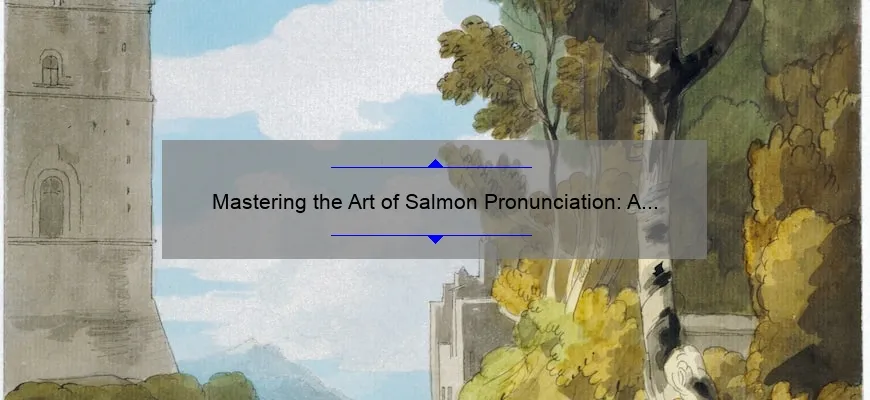Short answer salmon pronounce:
The correct pronunciation of “salmon” is SAM-ən. The l in the word is silent and should not be pronounced, although some dialects may have variations.
Salmon Pronunciation 101: FAQs Answered
As one of the most popular fish in North America, salmon is a staple in many households and restaurants. Whether you enjoy it grilled, smoked or baked into savory dishes such as sushi rolls or Akutaq, there’s no denying its versatility and deliciousness.
But with different species of salmon found around the world – from Sockeye to Coho and Chinook to Atlantic – pronouncing their names can be confusing. So here are some frequently asked questions about how to pronounce these beloved fish correctly!
Q: How do I pronounce “salmon”? Is there an L sound?
A: Yes! The correct pronunciation includes an L sound; so say “saa-mon”.
Q: What about “Sockeye” Salmon?
A: It sounds like ‘sock-eye’, not “so-skee” (as pronounced by some).
Q: And what’s up with King Salmon?
A:.This variety should technically be called chinook high-grade because when Pacific Northwestern tribes designated this particular strain they used multiple words for quality grades other than king.
Q:.How do You Pronounce“Coho”?
A:The word coho actually stands for silver salmon .It‘slysoundsglike koh-hoe.”
So now that we’ve got those basics down let’s look at tricky ones:
Q.What About Chum?
A.This has a funny history behind its name- comes from Russian choom which means dog.The reason why chums were identified similarly was because both dogs & salmons headed straight back source without stopping until destination reached,it stuck over time.It rhymes somewhat too—chuhm/bum/…yum!
Q.How Do You Say Steelhead ?
A:Easily mispronounced,having nothing whatsoever related steel nor head!.The corrwct way goes something along lines stee-l-heh-d.In essence,picture yourself conjuring image sturdy trout-type,with decisive headstrong nature
Q.What About Atlantic Salmon ?
A:It’s pronounced “uh-tlan-tic”. With the emphasis on first syllable.
So there you have it—a short but sweet guide to pronouncing salmon types correctly! Next time you order fish at a restaurant or impress your friends with seafood knowledge; make sure incorporate correct pronunciation of most popular salmons.A little bit humor and relatability never hurt anyone,right?
Breaking Down How to Properly Say ‘sal-mon’: Tips and Tricks
So, what are some tips and tricks for pronouncing salmon correctly?
1. Silent “L”
The “l” in Salmon is silent. This means that when saying this particular fish name, we don’t need to emphasize or even utter it at all – instead of ‘Salm-on’, say Sam-un’. You may have been corrected by someone who insisted there was no such thing as a sam’un—knock their socks off now!
2.Articulation
Articulate every syllable very carefully without missing out any letters.For instance,someone might be tempted to call it sah-mon.It should pronounced softly.Identify where there stresses fall because getting them right would improve on diction prounciation- SAM-an
3.Avoid adding extra accents
Avoid falling into pronunciation traps like adding unnecessary emphasis.Ensure each sound comes through naturally.The trickiest part about the English Language?It doesn’t always follow logical rules.Even native speakers have found themselves fumbling over certain words from time-to-time.Developing familiarity overtime reduces chances of making these mistakes regularly.People often use incorrect stress patterns taking cues from French,classical Latin or other languages which could result in confusion.Determine whether its two distinct sounds/phonemes coming together loosely.a/sal-Mon.Give attention and make adequate room between both phonemes.Alternately,pull threads apart thoughtfully so they stand alone:an;a;mazing;sa;l.mon
4.Sound symbolic effect
There has also been research done suggesting humans tend towards using verbal effects whenever describing a taste thats sharp,bitter,vinegary etc.Try sounding out pungent descriptive adjectives against flavor groups known similar.Tipsy salMon instead of saLmon, for instance.
5. Stick to your guns
Don’t be shaken up by the way someone else pronounces it or a variant that is incorrect.Credible dictionaries and reliable sources confirming correct pronunciation should only justify whatever side you have chosen .Everybody has an intonation they are more comfortable with but getting salmon right sure adds alot on ones confidence in spoken English
Here’s where things get even fishier – five fascinating facts about how ‘salmon‘ is correctly pronounced:
1.Two Half-Truths Make A Whole?
Its not viable either calling it salmon(shares sounds with almandine) nor sal-mo-n (this gives other phonemes unacceptably prominence).The proper articulation shouldn’t sound like PSA l’maughn rather SAM’en
2.Angering The French
Although would seem logical since its roots come from france ,you might want to forget everything taught.For instance,reverend Charles Caesars reversed L spelling version-salmoun,cant find itself in todays most widely recognised linguistics scholarly works.Grammarians later created their own course after sensing obvious discrepancy between grammar rules forced onto french words as compared phrases which originated from Victorian England.These changes inevitably led differences however small regarding annunciation.
3.Ocean Of Pronunciations
Regional accents across locals give rise t various different ways off saying certain words.Variability often seen along coast-living communities,sal-mon being no exception.In the Alaskan regions,it’s sometimes called Sowmun,Saam-un/Saw-man .
4.Use Your Nose!
Another handy trick could also possibly lie behind linking smell patterns experienced when cooking Salmon.Enhancing tasting adventures must go beyond what we can taste.Here interested individuals take advantage of scent memories hence developing clever tips.Bring yourself closer while baking/broiling/grilling varieties allow sense organs pick out unique sensories peculiarly gathered through olfactory neurons.To land that taste teaser this counterbalances any uncertainties about saying salmon the right way ensuring its unmistakable.
5.Change Your Method
Finally, headphones come in as an unlikely tool providing visual learning avenue on most pieces of art.Linguistics is not different!It turns out; sometimes articulation patterns are better expressed when we can watch through videos or audio files.Working with professional sound engineers allows recorders pick up rhythmic patterns and prescribe alternative ways to match similar effects long after exercise.








